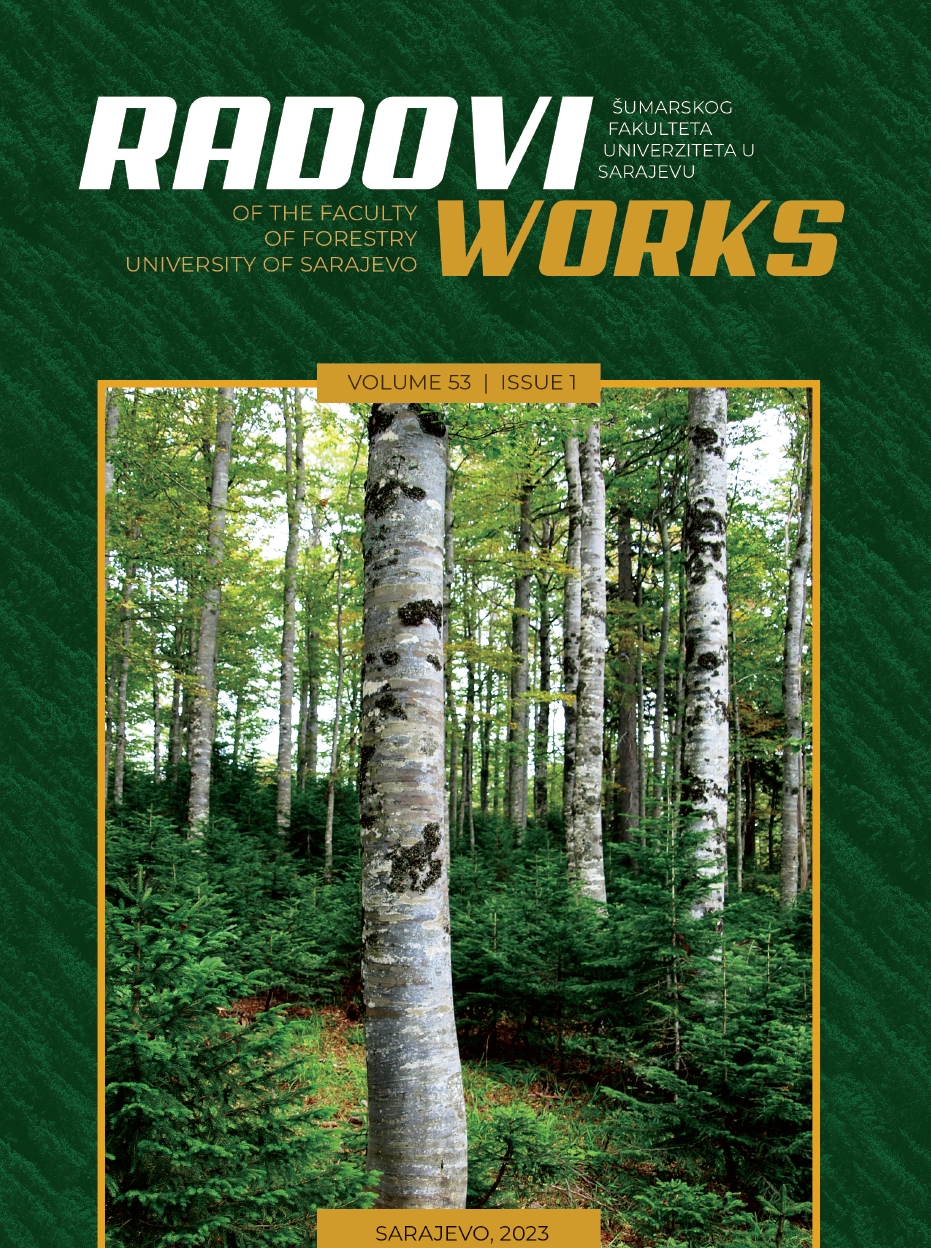Uticaj krčenja šuma na prihode seoskih domaćinstava u državi Oyo, Nigerija
DOI:
https://doi.org/10.54652/rsf.2023.v53.i1.553Ključne riječi:
deforestation; livelihood; household income; agroforestry; Oyo stateSažetak
The study examined the effects of deforestation on rural household income in Oyo state, Nigeria. The specific objectives include; identification of the types of livelihood activities; identifying the causes of deforestation; and to determine the effects of deforestation on the household income. A total of one hundred and eighty (180) rural dwellers were interviewed in 2020. We collected the data through the use of questionnaires and focus group discussions analysed the data with descriptive statistics and ordinary least square regression (OLS). The result shows that the majority (85.5%) of the respondents were farmers. The livelihood activities employed by the rural households include the combination of farming with any of charcoal production and livestock rearing (50%); charcoal business (33%); the gathering of non-timber forest products (14%); and artisanal work respectively (3.3%). The major causes of deforestation were farm expansion (55%), charcoal use (20.6%), building construction (11.7%), and lumbering (3.9%). The regression analysis revealed that farm expansion, charcoal business, and lwere found to increase significantly the household income in the study area. The study thereby recommends the adoption of agroforestry for improved livelihoods and to boost household income, energy, food security an
Downloads
References
Adu, G., Marbuah, G. & Mensah, J.T. (2012). Contribution of Agriculture to Deforestation in the Tropics: A Theoretical Investigation. African Review of Economics and Finance, 3(2): 1-13.
Alo, A.A. (2017). Spatial distribution of forest reserves and sawmills in Oyo state, Nigeria. Forests and Forest Products Journal 10: 60-72.
Annan, P. (2013). Annual deforestation rate and growth in gross domestic product in Brazil. Nature of Climate Change. 3: 7-9.
BENSEEDS (2004). Benue state economic empowerment and development strategy. Benue State Planning Commission, Makurdi.
Food and Agricultural Organization (FAO) (2014). State of the world’s forests 2014. Forests and agriculture: land-use challenges and
opportunities. FAO, Rome.
Food and Agricultural Organization (FAO) (2016). Global forest resources assessment 2015: how are the world’s forests changing? 2nd edn. FAO, Rome.
Fasona, M., Adeonipekun P.A., Agboola, O., Akintuyi A., Bello A., Ogundipe, O., Soneye, A. & Omojola, A. (2018). Drivers of deforestation and land-use change in southwest Nigeria. Springer Nature Switzerland AG 2018. W. Leal Filho (ed.), Handbook of Climate Change Resilience, pp. 1-24. https://doi.org/10.1007/978-3-319-71025-9_139-1.
Ibrahim, A., Iheanacho, A.C. & Bila, Y. (2015). Econometric analysis of causes and impact of deforestation on agriculture in Nigeria. Journal of Agricultural Economics, Environment, and Social Sciences. 1(1):142–150. Available: http://www.unimaid.edu.ng/jaees
Jatto, K.A., Akanbi, S.O., Adeoye, A.S., Oke, O.O. & Oyewole, O.O. (2021). Livelihood diversification among arable farm households in the forest zone of Oyo State, Nigeria. Nigerian Agricultural Journal, 52(2), 130-136.
National Bureau of Statistics (NBS) (2012). Annual abstract of statistics of the Federal Republic of Nigeria. Pp. 619.
Osoba, A.E., Atanda, T.A. & Bola, T.S. (2019). Effect of Deforestation on Rural Household Income in Selected Forest Dependent Communities in Odeda Local Council Area of Ogun State, Nigeria. Asian Journal of Research in Agriculture and Forestry, 3(3), 1-10. Article no. AJRAF.49889.
Oyebo, M., Bisong, F. & Morakinyo T. (2010). A preliminary assessment of the context for REDD in
Nigeria. Commissioned by the Federal Ministry of Environment, the Cross-River State's Forestry Commission and UNDP. Available online at http://www.un-redd.org/AboutUNREDDProgramme/NationalProgrammes/Nigeria/tabid/992/Default.asx
Oyetunji, P.O., Ibitoye, O.S., Akinyemi, G.O., Fadele, O.A. & Oyediji, O.T. (2020). The effects of population growth on deforestation in Nigeria: 1991 – 2016. J. Appl. Sci. Environ. Manage 24 (8), 1329-1334.
Oyo State Agricultural Development Programme (OYSADEP), 2017. Proposal of agricultural extension and Women in Agriculture (WIA) Component. Available at https://iart.gov.ng. Retrieved on 13/03/2022.
Sambe, L.N., Adeofun, C.O. & Dachung, G. (2018). The economic and ecological effects of deforestation on the Nigerian environment. Asian Journal of Advanced Research and Reports 1(2): 1-25, 2018.
Sims, K. (2021). No more shade: deforestation and rural-urban migration in Nigeria. Master's Theses. 816. The Aquila Digital Community. The University of Southern Mississippi. https://aquila.usm.edu/masters_theses/816.























